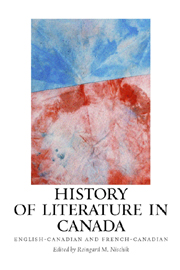Book contents
- Frontmatter
- Contents
- Acknowledgments
- Introduction: Writing a History of Literature in Canada
- I Beginnings
- II The Literature of New France, 1604–1760
- III The Literature of British Canada, 1763–1867
- IV From the Dominion to the Territorial Completion of the Nation, 1867–1918
- V The Modern Period, 1918–1967
- VI Literature from 1967 to the Present
- 21 Sociopolitical and Cultural Developments from 1967 to the Present
- 22 English-Canadian Literary Theory and Literary Criticism
- 23 The English-Canadian Novel from Modernism to Postmodernism
- 24 The English-Canadian Short Story since 1967: Between (Post)Modernism and (Neo)Realism
- 25 English-Canadian Poetry from 1967 to the Present
- 26 Contemporary English-Canadian Drama and Theater
- 27 Canons of Diversity in Contemporary English-Canadian Literature
- 28 Literature of the First Nations, Inuit, and Métis
- 29 The Quebec Novel
- 30 The French-Canadian Short Prose Narrative
- 31 French-Canadian Poetry from 1967 to the Present
- 32 Orality and the French-Canadian Chanson
- 33 Drama and Theater from the Révolution tranquille to the Present
- 34 Transculturalism and écritures migrantes
- 35 The Institutionalization of Literature in Quebec
- Further Reading
- Notes on the Contributors
- Index
31 - French-Canadian Poetry from 1967 to the Present
from VI - Literature from 1967 to the Present
Published online by Cambridge University Press: 12 September 2012
- Frontmatter
- Contents
- Acknowledgments
- Introduction: Writing a History of Literature in Canada
- I Beginnings
- II The Literature of New France, 1604–1760
- III The Literature of British Canada, 1763–1867
- IV From the Dominion to the Territorial Completion of the Nation, 1867–1918
- V The Modern Period, 1918–1967
- VI Literature from 1967 to the Present
- 21 Sociopolitical and Cultural Developments from 1967 to the Present
- 22 English-Canadian Literary Theory and Literary Criticism
- 23 The English-Canadian Novel from Modernism to Postmodernism
- 24 The English-Canadian Short Story since 1967: Between (Post)Modernism and (Neo)Realism
- 25 English-Canadian Poetry from 1967 to the Present
- 26 Contemporary English-Canadian Drama and Theater
- 27 Canons of Diversity in Contemporary English-Canadian Literature
- 28 Literature of the First Nations, Inuit, and Métis
- 29 The Quebec Novel
- 30 The French-Canadian Short Prose Narrative
- 31 French-Canadian Poetry from 1967 to the Present
- 32 Orality and the French-Canadian Chanson
- 33 Drama and Theater from the Révolution tranquille to the Present
- 34 Transculturalism and écritures migrantes
- 35 The Institutionalization of Literature in Quebec
- Further Reading
- Notes on the Contributors
- Index
Summary
THE YEAR 1967 — WHEN the Expo was held in Montreal and Charles de Gaulle proclaimed his notorious “Vive le Québec libre” — is seldom looked upon as a turning point in French-Canadian literature. The end of the 1960s did, however, demarcate a significant threshold of the coming-of-age of this literature: 1968 was not only the year in which the magazine Les Herbes rouges was founded and Michel Tremblay's (1942–) Les bellessoeurs premiered, it was also the year of important publications by avantgarde poets like Nicole Brossard (L'écho bouge beau) and Denis Vanier (Pornographic Delicatessen). Gaston Miron (1928–1996) even described the year 1970 as the end of an era. 1970 saw Montreal's legendary Nuit de la poésie and the (re)publication of “classic” authors such as Jean-Aubert Loranger, Hector de Saint-Denys Garneau, Anne Hébert, and Rina Lasnier. At the same time, Miron's L'homme rapaillé and an abundance of radically new poetry volumes were published — among them Brossard's Suite logique and Le centre blanc, Michel Beaulieu's Charmes de la fureur, Roger Des Roches's Corps accessoires, and Raoul Duguay's Manifeste de l'infonie. In addition, Luc Racine, Pierre Morency, Marie-Francine Hébert, Marie Laberge, Suzanne Paradis, Hélène Rioux, and Cécile Cloutier launched their debut volumes. To sum up, the late 1960s and early 1970s saw a remarkable range of extremely divergent and often conflicting literary productions.
This rich literary activity coincided with a number of political events. The Parti Québécois (PQ) was founded in 1968 and acted as a catalyst for renewed nationalism, at first aiming at the establishment of an associated state, later with the goal of full sovereignty and independence for Quebec.
- Type
- Chapter
- Information
- History of Literature in CanadaEnglish-Canadian and French-Canadian, pp. 456 - 469Publisher: Boydell & BrewerPrint publication year: 2008



